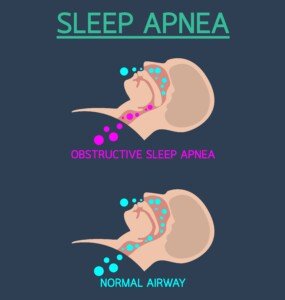
You should never assume that you can’t possibly have obstructive sleep apnea just because you’re lean, buff and compete in triathlons or CrossFit.
“While the majority are overweight or obese, thin people can have it as well,” says Dale Rice, MD, professor of otolaryngology-head and neck surgery, Keck School of Medicine USC.
The issue isn’t always body weight.
Obstructive sleep apnea involves a mechanical and structural problem in the throat – which, though exacerbated by obesity, can exist badly enough in the thin fit and athletic individual to cause OSA.
“People who are overweight can often make the OSA less by losing weight,” says Dr. Rice.
But this doesn’t mean that obesity is the only cause of obstructive sleep apnea or that lean athletes or workout buffs, including females, can’t have it.
“The loudest snorer I have had was a thin 80 year old woman who was waking up her next door neighbor,” says Dr. Rice.
A long soft palate is the culprit, says Dr. Rice. This is the flexible and fleshy part of the throat towards the back of the mouth’s roof.
Some people naturally have a long soft palate that has surplus tissue, and they may also have a big tongue base.
“Almost all have a parent with OSA,” points out Dr. Rice, referring to trim and physically fit people who have sleep apnea.
Excess fat in the body will certainly plump up that surplus tissue and either cause sleep apnea or make pre-existing OSA worse.
When the person is asleep, the tissue in the back of the throat becomes relaxed and may “fall” backwards against the airway, obstructing it. See below.

Shutterstock/iLoveCoffeeDesign
In mild OSA cases, sometimes fat loss is sufficient to correct the problem. But a thin or non-overweight person with OSA doesn’t have any weight to lose to mitigate the problem.
Exercise won’t help. Diet won’t help. Remember, it’s a structural and mechanical issue in the throat that affects the airway.
In mild cases, avoiding sleeping on one’s back or sleeping with one’s torso propped up can resolve the issue.
Diagnosing Obstructive Sleep Apnea
If a thin person snores like a freight train, it’s a safe bet that he or she has obstructive sleep apnea. However, not all people with OSA snore!
If you have symptoms that are suspicious for OSA, it can be diagnosed only via a lab or home sleep study.
If a doctor says, “You can’t possibly have sleep apnea bacause you’re too thin/fit/physically active,” then see another doctor—preferably an ear, nose and throat specialist (otolaryngolist) or a doctor board certified in sleep medicine.
Other Symptoms of OSA that Can Affect Thin Physically Fit People As Much As Overweight
• Morning headaches that quickly disappear once you’re up and about.
• Repeated need overnight to urinate, even if you withhold liquid intake for several hours preceding bedtime.
• Waking repeatedly in the middle of the night gasping for air or feeling as though you have not taken a breath for a while.
• Bed partner reports seeing you stop breathing for extended periods or reports that you choke or gasp in your sleep.
• Unexplained daytime drowsiness.
• Easily dozing off while driving.
Though ads or articles about sleep apnea typically show a portly middle aged man using a CPAP machine, this is because – quite frankly – photographers are just as influenced by misconception as is everyone else.
So they hire a model who fits the stereotype of a sleep apnea patient: an overweight middle age man.
But now you know why fit, trim, buff, athletic and physically fit people, including women, can have obstructive sleep apnea.
 Dr. Rice’s areas of interest include sinus disease, endoscopic sinus surgery, head and neck cancer, and skull base surgery.
Dr. Rice’s areas of interest include sinus disease, endoscopic sinus surgery, head and neck cancer, and skull base surgery.
 Lorra Garrick has been covering medical, fitness and cybersecurity topics for many years, having written thousands of articles for print magazines and websites, including as a ghostwriter. She’s also a former ACE-certified personal trainer.
Lorra Garrick has been covering medical, fitness and cybersecurity topics for many years, having written thousands of articles for print magazines and websites, including as a ghostwriter. She’s also a former ACE-certified personal trainer.
.









































